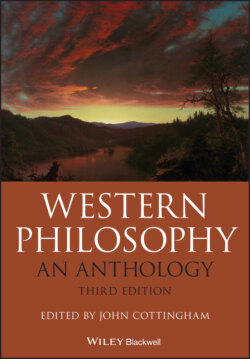Читать книгу Western Philosophy - Группа авторов - Страница 88
PART II Being and Reality Introduction
ОглавлениеOne of the oldest aspirations of philosophy has been to enquire into the ultimate nature of reality. The phrase sounds impressive enough, but what does it mean? Nowadays most people would say that investigating what there is, or what the world is like, is the job of the scientist, not the philosopher. But in earlier times the two roles were not clearly separated. When the writers of the Middle Ages described Aristotle as a philosopher (indeed he was known as The Philosopher), they were thinking partly of his accounts of the natural world, his physics, biology and so on. But Aristotle also aimed to investigate the nature of ‘being qua being’, or being as such; he wanted to analyse the basic notions that are involved in our understanding of the world. The book in which he presents this idea of a general study of being is called the Metaphysics. The term originally derives from the position to which the book was assigned by early Greek editors of Aristotle, who placed it after his various writings on physics (in Greek meta ta physica, ‘after the physics’). But since the Greek preposition meta can also mean ‘beyond’, the term ‘metaphysics’ came to be used as an apt label for philosophical inquiry that goes beyond the particular sciences and asks very general questions about the nature of reality and the ultimate conceptual categories in terms of which we are to understand it. The history of metaphysics is the history of various fundamental theories about ‘ontology’ or being, and it is some of the most influential of these theories that form the subject matter of this part of the volume.
